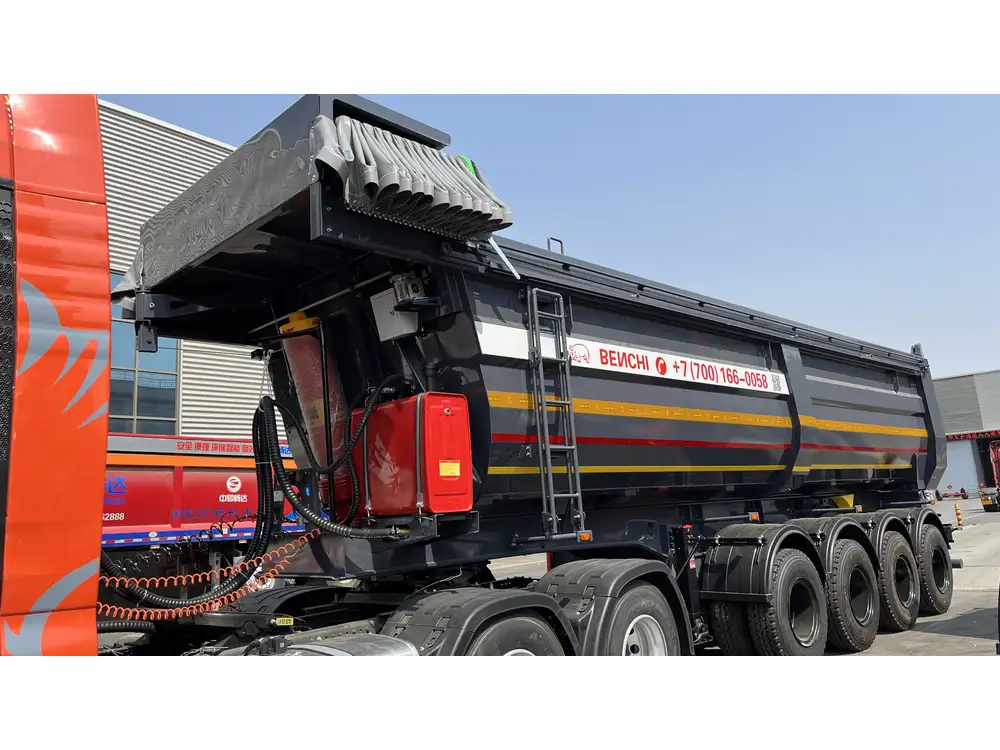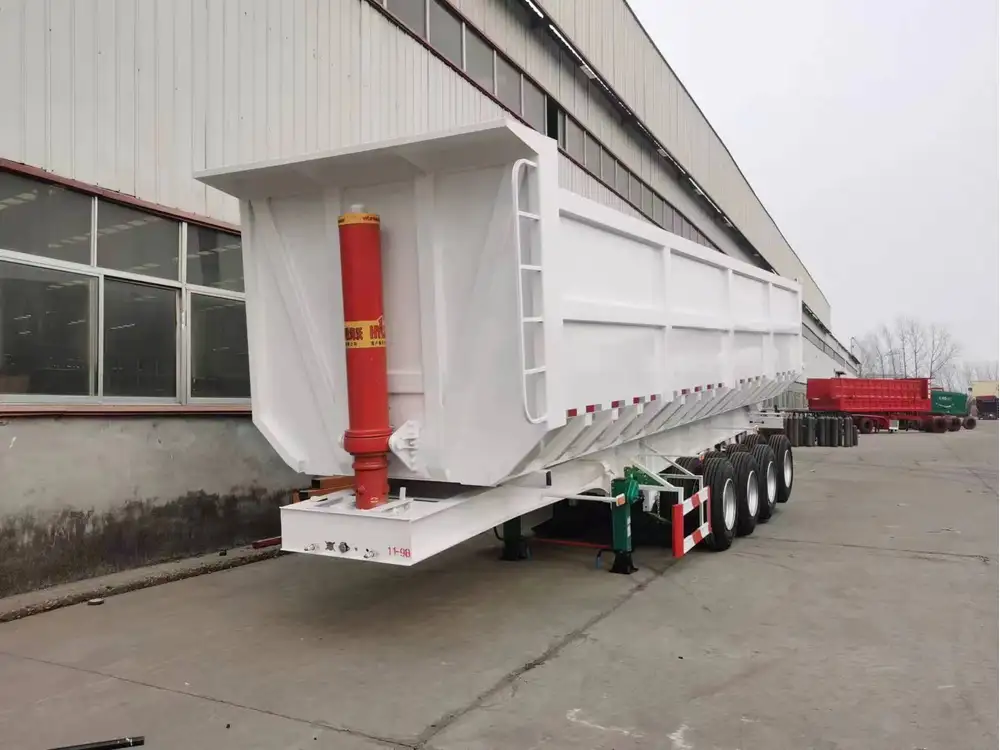When delving into the world of freight transport, one question frequently arises: How much does an empty semi box trailer weigh? This inquiry is not merely academic; understanding the weight implications of semi box trailers is crucial for logistics managers, fleet owners, and operators alike. In this article, we will provide an exhaustive analysis, breaking down every relevant aspect to offer you the most in-depth insights into the weight of empty semi box trailers.
The Basics of Semi Box Trailers
Semi trailers, often referred to as semi box trailers, are an integral part of the freight transportation system. These trailers are designed to be towed by a semi-truck, facilitating the efficient movement of goods across vast distances. Their structure includes a rigid framework designed to provide strength, durability, and the capacity to withstand various environmental conditions.
Typically, semi box trailers come in several variations, including:
- Dry Van Trailers: Enclosed and ideal for transporting non-perishable goods.
- Reefer Trailers: Equipped with refrigeration for perishable items.
- Flatbed Trailers: Open, with no sides or roof, suitable for heavy machinery or large items.
Key Specifications of Semi Box Trailers
| Type of Trailer | Average Weight (lbs) | Average Length (ft) | Common Uses |
|---|---|---|---|
| Dry Van | 10,000-16,500 | 48 – 53 | General freight, non-perishable goods |
| Reefer | 12,000-16,000 | 48 – 53 | Perishable goods requiring refrigeration |
| Flatbed | 10,000-12,000 | 48 – 53 | Wide loads, heavy machinery |

Factors Influencing the Weight of Empty Semi Box Trailers
The empty weight of semi box trailers fluctuates based on several factors, including materials used, design features, and dimensional specifications.
1. Material Composition
- Aluminum vs. Steel: Aluminum trailers are lighter, typically weighing around 10,000 to 12,000 lbs for dry vans. Steel trailers, often heavier (up to 16,500 lbs), offer increased durability, particularly for heavy loads or rugged conditions.
2. Design and Engineering
- Construction Quality: High-quality, well-engineered designs will often feature reinforced joints and properly distributed weight, allowing for a lower overall weight while maintaining strength.
- Aerodynamics: Trailer designs that incorporate aerodynamic principles can reduce overall weight while improving fuel efficiency, affecting operational costs positively.

3. Additional Features
- Flooring Options: Wooden flooring may increase weight, whereas composite materials can reduce it.
- Suspension Systems: Advanced air suspension systems can add weight but enhance handling and stability.
Typical Weights of Different Types of Semi Box Trailers
Breaking down the weights of various trailer types provides clarity for understanding their weight implications relative to cargo loading and compliance with weight regulations.
| Type of Semi Box Trailer | Empty Weight (lbs) | Cargo Capacity (lbs) | Compliance Considerations |
|---|---|---|---|
| Standard Dry Van | 10,000 – 15,000 | Up to 45,000 | Must comply with DOT regulations for total weight |
| Refrigerated Trailer (Reefer) | 12,000 – 16,000 | Up to 44,000 | Requires additional cooling unit weight considerations |
| Flatbed | 10,000 – 12,000 | Varies based on load type | More flexible but must consider securement methods |
Practical Implications of Trailer Weight for Logistics
Weight plays a pivotal role in the operational efficacy of freight logistics. Understanding how to distribute weight across cargo loads can minimize costs and maximize efficiency.

Regulatory Compliance
Transport regulations stipulate specific total weight limitations, generally 80,000 lbs for a combined vehicle (truck plus trailer) on public highways. Knowledge of empty trailer weights allows operators to optimize payloads to remain compliant, avoiding costly fines and ensuring safety on the roads.
Fuel Efficiency Considerations
Heavier trailers exert additional strain on towing vehicles, leading to increased fuel consumption. Lightweight trailers can significantly reduce operational costs over time, leading to overall savings while maintaining robust profit margins.
Maintenance and Durability Factors
Heavier trailers may experience different wear patterns and stress points than lightweight counterparts. Understanding weight implications can influence maintenance schedules and practices, thereby improving longevity and performance.
| Maintenance Focus | Heavy Trailers | Light Trailers |
|---|---|---|
| Tire wear | Higher; frequent checks necessary | Moderate; routine checks |
| Suspensions | Strain increases wear | Lower strain, longer intervals |
| Frame and chassis | Increased stress | Generally lower stress |

Addressing User Intent and Additional Concerns
The inquiry regarding the weight of empty semi box trailers often branches into side discussions. Below, we highlight pertinent queries that frequently arise among users and address them in a structured manner.
How to Determine the Trailers Suitable for Specific Loads?
Choosing the right trailer type depends on the nature of the cargo. If you’re transporting perishables, reefer trailers are indispensable. Conversely, flatbeds are optimal for heavy machinery. Understanding the correlation between the trailer type and its weight capacity ensures effective load management.
What Are the Effects of Overloading a Trailer?
Overloading can lead to serious safety hazards, including:
- Increased Stopping Distance: Heavier loads require longer stopping distances, increasing accident risks.
- Legal Penalties: Fines and penalties are imposed for exceeding weight limits.
- Damage to Equipment: Overloading stresses the trailer and towing vehicle, leading to premature wear and costly repairs.

Are There Technological Solutions for Monitoring Trailer Weight?
Recent advancements have introduced innovative technologies for monitoring weight:
- Onboard Scale Systems: These systems can provide real-time weight data, ensuring operators never exceed trailer limits.
- Telematics: Using sensors and GPS, telematics systems can track load weights and optimize routes based on cargo weight, enhancing efficiency.
How Can Proper Maintenance Affect Weight Management?
Routine maintenance is crucial in managing weight and ensuring trailer longevity. Regular inspections can identify structural wear and fatigue, allowing for timely repairs that prevent sudden failures during operations.
| Maintenance Practices | Impact on Weight Management |
|---|---|
| Regular tire and brake checks | Ensures safe handling and load distribution |
| Frame inspections | Identifies potential weakening that could alter weight distribution |
| Proper lubrication of components | Reduces friction, improving fuel efficiency |
Conclusion
Understanding the weight of empty semi box trailers is critical for operators, fleet managers, and logistics professionals who aim to optimize their operations while ensuring regulatory compliance and maintaining safety standards.
With average weights varying by type, factors influencing weight should be assessed carefully to select the appropriate trailer for specific logistics needs. Furthermore, considering implications such as regulatory compliance, safety, fuel efficiency, and maintenance can lead to better operational decisions.
For any freight operation, knowledge is power. Ensuring you are equipped with the right understanding of your trailer’s specifications can streamline your logistic processes, reduce costs, and improve overall profitability. As the freight industry evolves, staying informed will ensure that your operations remain both competitive and efficient in a burgeoning market.



